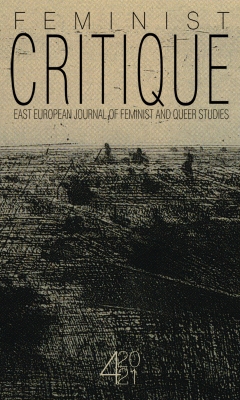Following the CfP, the QueerFemSEE Proceedings online issue published in Feminist Critique – East European Journal of Feminist and Queer Studies is available here.
This “Feminist Critique” special issue contains papers presented at the “Queer and Feminist Studies in Eastern Europe” International Conference at the University of Bucharest (Romania) on November 17–19, 2017. The papers touch upon a variety of topics, including racism, nationalism, coloniality, necropolitics, “wildness,” neoliberalism, post-socialist urbanism, and same-sex parenting and explore cases of Greece, Georgia, Ukraine, Slovakia, Hungary, and Russia.
Guest editors: Ramona Dima and Simona Dumitriu.
Issue DOI: https://doi.org/10.52323/fc4
The cover is designed by Valentyna Petrova. On the cover: a fragment of the “View of Quarry” artwork by Latvian-American artist Vija Celmins (1962).
Call for Submission of Papers
Dear Colleagues,
Following QueerFemSEE – Queer and Feminist Studies in Eastern Europe International Conference (17-19 November 2017, University of Bucharest), Feminist Critique. East European Journal of Feminist and Queer Studies has invited us to contribute to a special issue dedicated to the topics addressed by the conference.
Therefore, we are inviting the participants of QueerFemSEE conference to submit papers related to the topics you have presented in the frame of the conference or to wider topics connected to your research, interests or activities. We remind you that the main questions debated during the conference dealt with intersectionality from an Eastern European (or SEE) perspective:
Although in the last decades scholars in cultural and media studies have begun to address issues such as gender, race, ethnicity, disability, sexualities in their work, there is still a gap concerning the amount of research in this direction between Western academic spaces and the Eastern ones. Considering this, the question which can be raised is if Western feminist and queer theories can be applied (and if yes, to what extent) to other local contexts? How are the frameworks and operating concepts constructed? How can cultural and media analysis benefit from these paradigms? What are the examples of ‘national’ or ‘local’ queer cultures and media representations and what are their particularities in comparison to other cultures (from other geo-political contexts)?
We are looking for two types of papers:
-
Short papers, outlining the topics presented in the conference (3000 words maximum). These will not go through a peer review process.
-
Long papers, of a more academic nature, which can expand on the topics you have addressed in your conference presentations. (5000-10000 words). These will be peer reviewed.
Both types of papers are subject to selection.
If you are interested in contributing to Feminist Critique, please write to queerfemsee@gmail.com no later than Sunday, February 9h 2018, and send us an attached text document including your abstract proposal for the paper (maximum 200 words for short papers and 300 words for long papers, in English) and a clear mention of what type of paper are you aiming to write – a short one or a long one – and in which language are you aiming to write it (possible languages: English, Ukrainian or Russian).
We would be extremely happy to receive your proposals for papers, because we find it important to have as many records of QueerFemSEE as possible – in order to make sure that the shared effort of everyone involved (participants, organizers, and all the persons who helped during the conference) is not lost, and that this first moment of queer studies coming together in the Romanian academia at the initiative of local queer persons gets to be remembered and solidified by your written contributions. So we thank you in advance for your effort.
The articles will be published in Feminist Critique. East European Journal of Feminist and Queer Studies. The short articles will be published all together, in a small special issue, and the long, peer-reviewed articles will be published in an ongoing fashion – whenever the reviewing and editing of each article is finished.
As some of you already sent us their articles, please note that they will be included in the selection process.
Important dates:
Deadline for abstracts: 9 February 2018
Letter of acceptance/rejection: 25 February 2018
Other materials: each published paper, short or long, needs to have one picture included as header. Therefore, when you submit your full papers for review, please do not forget to also send at least one picture in jpeg format, good resolution, and include, in a separate text documents, information about the picture/s: copyright (credits, author, source), short description of the image, any other explanations you find necessary.
Timeline:
Deadline for the short papers to be sent to us in full: 30 April 2018
Revisions, editing: May-July 2018
Publishing of short papers : August-September 2018
Deadline for the long papers to be sent to us in full: 30 May 2018
Peer review: June-August 2018
Sending out revisions and receiving revised long papers: September-October 2018
Following eventual translations and final copy editing, the long papers will start to be published from October 2018 onward.
Journal languages – Ukrainian, Russian, and English.
Feminist Critique guide for authors: http://feminist.krytyka.com/en/guide-authors
